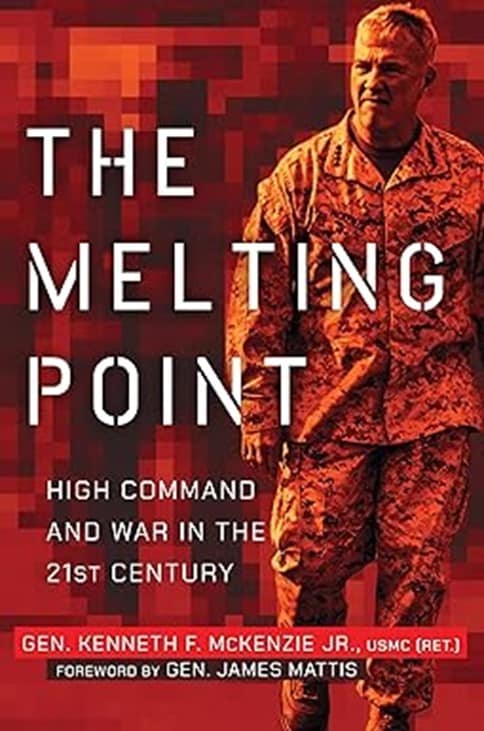Below is a review of the new memoir by MEMRI Board of Advisors member USMC Gen. (Ret.) Kenneth F. McKenzie, Jr. The review is by MEMRI Vice President Amb. Alberto M. Fernandez.
The Melting Point: High Command and War in the 21st Century
Gen. Kenneth F. McKenzie
Naval Institute Press, 2024

There is a point in Gen. Kenneth F. McKenzie's superb new memoir when the CENTCOM commander is dragooned into being a part of an August 2021 meeting with the Taliban political committee in Doha. McKenzie's superiors want him to present the Taliban with a map showing the area the Taliban should stay out of as the Americans and their allies flee from Kabul. One of the Taliban commanders drily notes that it is obvious that the map was prepared a day or two ago (it was), as it is already out of date. The Taliban were already far inside the neutral zone the Americans suggested.
McKenzie's new book, a memoir of his eventful three years as CENTCOM Commander (March 2019-April 2022) is a rarity, a contemporary memoir by a senior American government official or general officer that is actually readable, interesting, and, often, even riveting. McKenzie is an able writer, mixing enough personal anecdote and background information with unfolding events to keep things alive and interesting. But he was also blessed with, among other events, three historic incidents as basic material to work from: the elimination of the "Caliph" of the Islamic State, Abu Bakr Al-Baghdadi in October 2019, the January 2020 strike which removed Iranian Islamic Revolutionary Guard Corps (IRGC) Quds Force commander Qassem Soleimani and the debacle which was the triumph of the Taliban and the chaotic US withdrawal from Afghanistan in August 2021.
There is a certain irony in being the commander at Central Command (CENTCOM). It has usually been the "redheaded stepchild" among the regional combatant commands (particularly compared to the historic U.S. military commands in Europe and the Pacific), "off axis and low priority." And yet it is the American military command that in recent decades most often engaged in actual combat – "not training or exercises or deterrence" as the big brothers in EUCOM or PACOM do. As such, it has produced some of the best known and most successful generals in recent American military history – Norman Schwarzkopf of Desert Storm, John Abizaid who went on to be President Trump's Ambassador to Saudi Arabia, David Petraeus who would go on to be CIA Director, and two generals – Jim Mattis and Lloyd Austin – who would both become U.S. Secretary of Defense. It is a bright and broad stage on which to succeed or fail spectacularly. By all accounts, McKenzie did extremely well as CENTCOM commander in a period of extreme danger and volatility, even for a usually dangerous and volatile Middle East.
There is much here to digest and ponder on the larger issues of command and leadership in a book that moves briskly, but McKenzie's minute combatant commander's bird's-eye view as these three events – two triumphs and one disaster – unfold in real time is as tense and well-done as a blockbuster Hollywood thriller, and all the more so because the events and the people involved are real.
The three overarching themes of the book are the importance of civilian control over the military, the uniqueness of being a combatant commander, and that leaders and leadership really do matter. It is U.S. combatant commanders alone who provide policy recommendations to the senior civilian leadership, and then have the often-unenviable task of "taking those decisions and transmuting them into corporeal action." They are field commanders who face the daunting challenge of managing both up and down, but with real human lives at risk under their direct command.
A perfect example of this in action was McKenzie's advice on how to manage the Afghanistan withdrawal – advice which was rejected by the Biden administration, but the CENTCOM commander still had to carry out a flawed plan that he knew was likely to go bad (and did). As he notes, as late as the first week of August 2021, the administration wanted to have it all: "leave Afghanistan, continue to influence events there through a large and robust embassy platform, and carry out counterterror operations. Reality would soon intrude on these dreams." While it was Trump whose agreement with the Taliban began the countdown to withdrawal, it was the fateful decisions taken or not taken by the Biden team in April 2021 that made the chaos and death that summer inevitable. Not wanting to alarm the Afghan leadership, the Americans waited too long to draw down the embassy and begin withdrawing Americans and at-risk Afghans.
While these three big events – the elimination of two high value terrorist targets and controversial end of decades of American misadventure in Afghanistan – are the high points of McKenzie's narrative, I appreciated the attention to detail and human dimension constantly present in the work. McKenzie trusts a subordinate with whom he "once shared a two-man cave dug into four feet of snow at an elevation of nine thousand feet." IRGC Qods Force commander Qassem Soleimani is killed on "route Irish," the treacherous road from Baghdad International Airport where quite a few U.S. servicemen had been killed as a direct result of Soleimani's plotting. But when he is eliminated, there was "no cheering, no fist-bumping, just silence."
Along with the human dimension, there is real wisdom – "Afghanistan was not ungovernable, but it is ungovernable within the structure of an imported Western model." And "Iran would seek to maximize early strikes, then offer to de-escalate before the United States could gather, deploy and apply its overwhelming strength." We still have good, smart general officers. Now if only we could do something about improving the quality of the civilians who are giving them their marching orders.
* Alberto M. Fernandez is Vice President of MEMRI.




